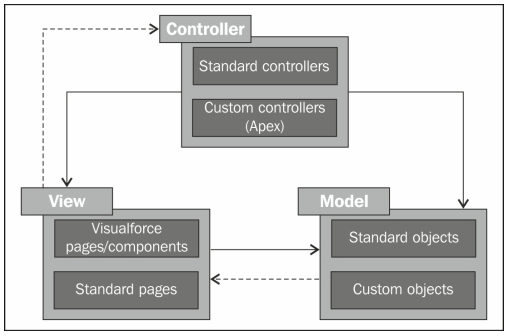Salesforce MVC Architecture ( Model - View - Controller )
Salesforce MVC (Model view Controller) separates the complexity of the business logic from the User Interface and database. Salesforce MVC architecture helps to develop powerful business application. Everything we develop in Salesforce is part of Model View Controller.
Also, It is very important to understand about the flow of the real-time project when working with SFDC MVC architecture in an organization / individually. Everything we develop in Salesforce is a part of Model View Controller.
Model :
- It is also called as a Database-Layer.
- Model or the database is the backbone which forms the bridge between View and Controller.
- In Salesforce, we can say that sObjects are the model as every entity in salesforce is mapped to some sObject.
- Objects, Fields, Relationships come under Model Layer of Model View Controller in Salesforce.
View :
- It is also called as a User-Interface-Layer.
- Visualforce Pages are used to present the data to users / create the user interface.
- Force.com uses Visualforce pages and standard UI buttons, forms, tabs and page views to define a view.
- Visual Force pages, Page Layouts, Tabs comes under View Layer of Model View Controller in Salesforce.
Controller :
- It is also called as a Business-Logic-Layer.
- Every event performed on the page will be controlled by controller. Force.com uses Apex triggers and Apex Controllers as the controller in the Salesforce MVC architecture.
- Workflows, Apex Classes, Triggers comes under Controller part in Model View controller in Salesforce.
Declarative Development in Salesforce.
Declarative development in Salesforce is done by point-and-click with out using single line of code using browser. In this method, Salesforce follows MVC Architecture when developing application.
| Model | View | Controller |
| Objects | Applications | Workflow Rules |
| Fields | Tabs | Validation Rules |
| Relationships | Page Layouts | Assignment Rule |
| Records Types |
Programmatic Development in Salesforce
In this model of development in Salesforce, Salesforce coding is required. The Salesforce MVC architecture are as follows.
| Model | View | Controller |
| Web Services API | Visualforce Pages | Apex Controllers |
| Metadata API | Visualforce Components | Apex Trigger |
| External Object | Site | Web Service API |
By : Harshal Lad

Comments
Post a Comment